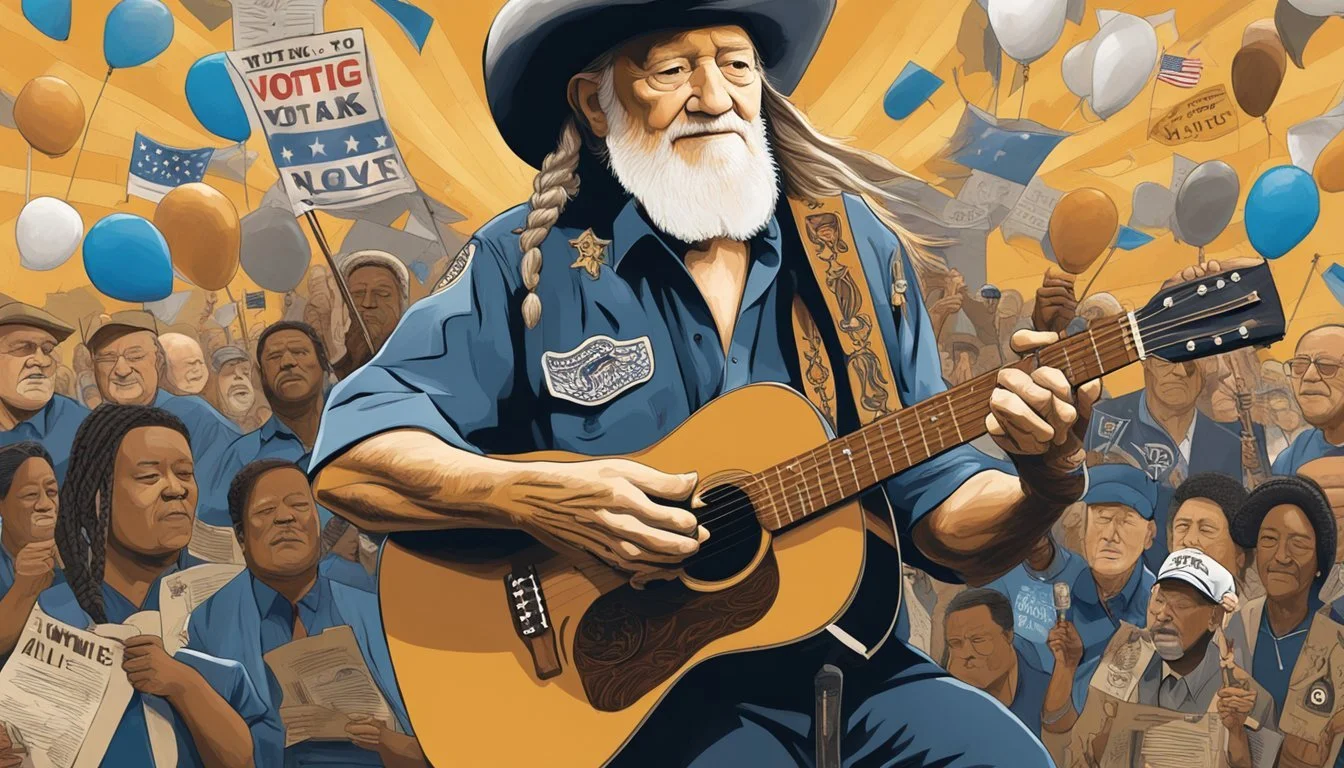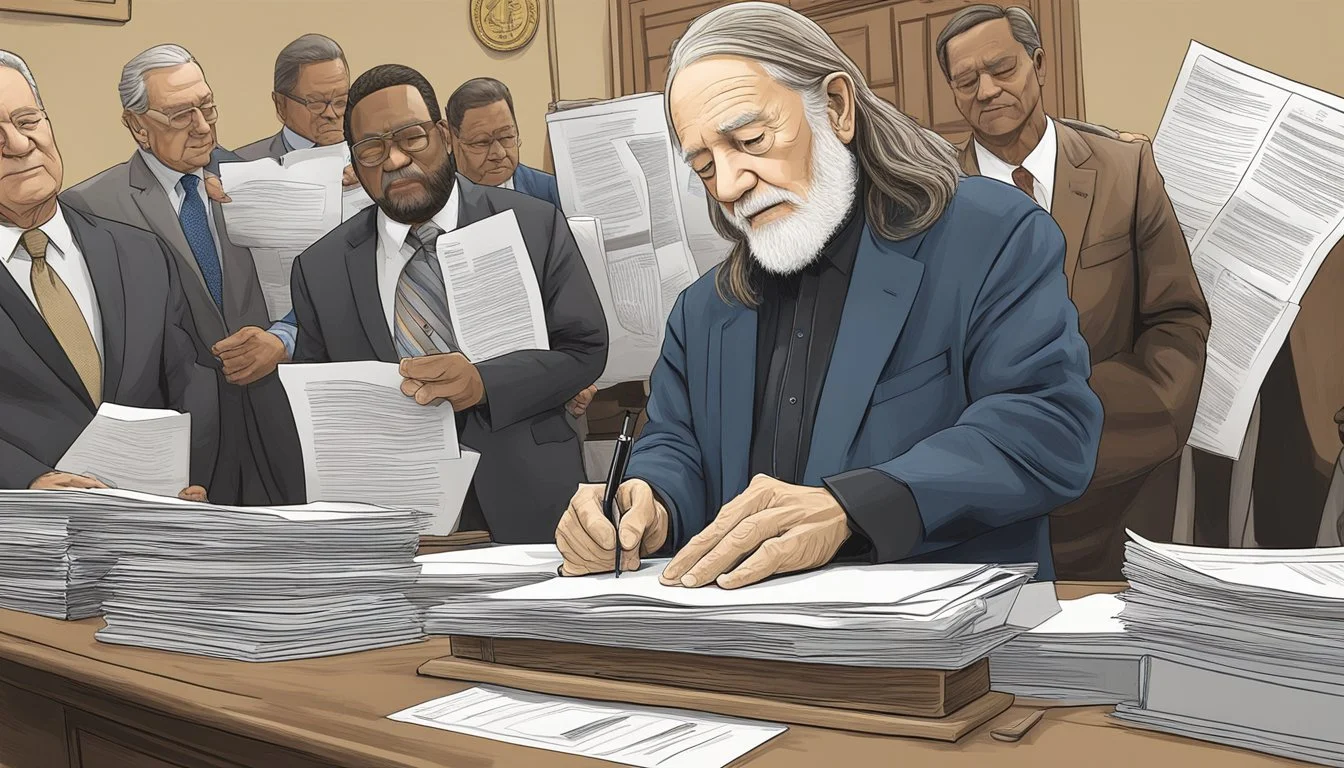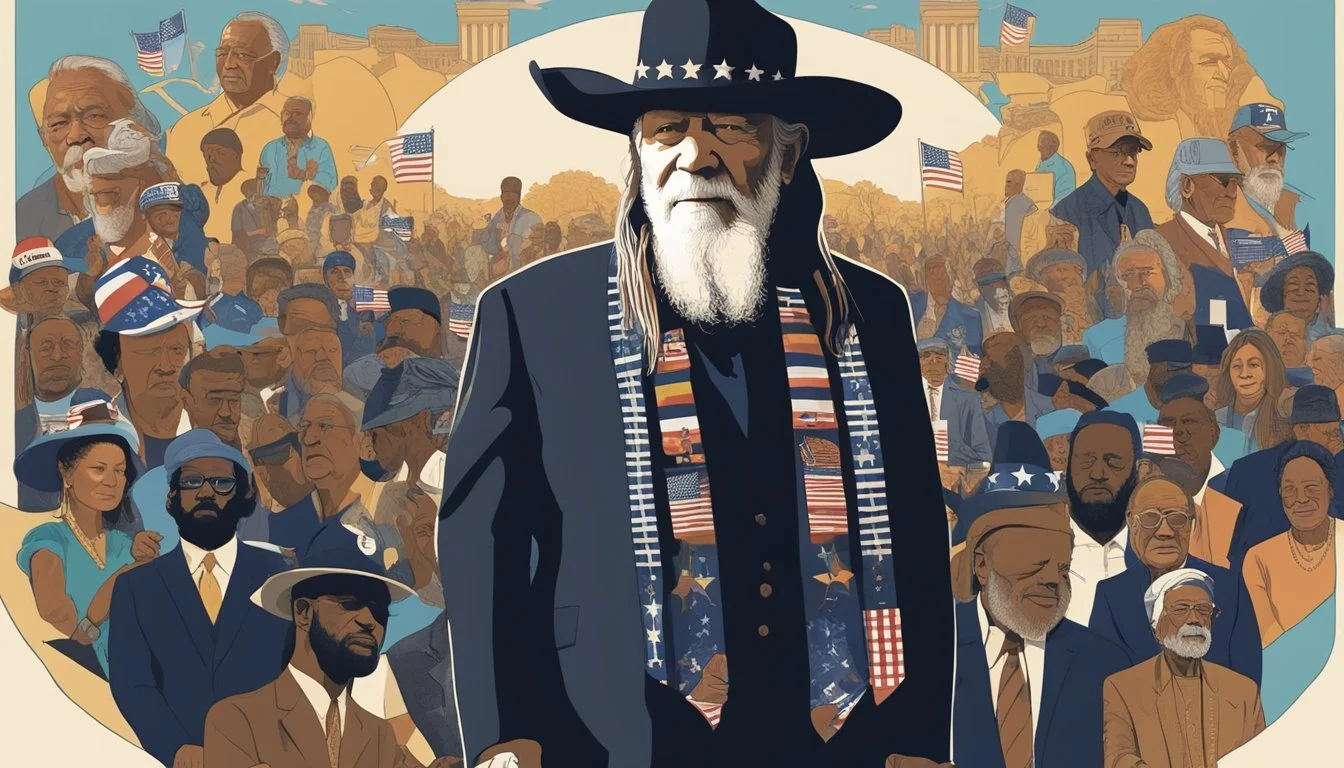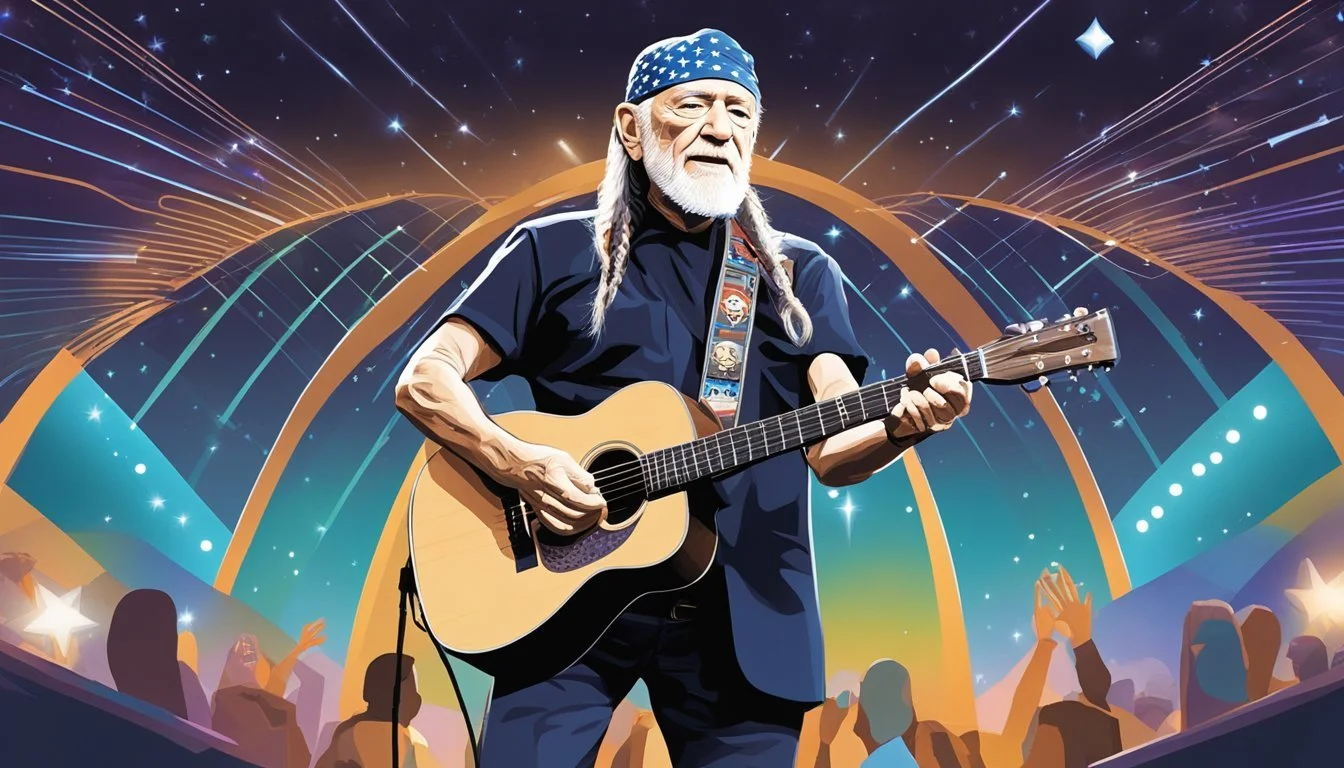Willie Nelson Voting Rights: The Country Legend Leading the Fight for Democracy!
Willie Nelson, the iconic country music legend, has long been known for his musical talents. In recent years, he's also become a vocal advocate for voting rights. Nelson made headlines when he headlined a protest rally in Texas, lending his voice to support Democratic state legislators opposing GOP-backed voting restrictions.
The rally marked the culmination of a four-day march for voting rights. Nelson led over a thousand spectators in singing "Vote Them Out" from the steps of the Texas Capitol, using his platform to amplify the message of voting rights advocates. His participation brought significant attention to the issue, demonstrating the power of celebrity influence in political movements.
Nelson's involvement in the voting rights cause highlights the ongoing debate surrounding election laws in Texas and other states. His presence at the rally served to energize supporters and draw media attention to the concerns raised by voting rights activists. The event showcased how public figures can play a crucial role in mobilizing grassroots support for political causes.
Background of the Issue
The Texas voting rights debate emerged from proposed legislation and political tensions following the 2020 election. Supporters and opponents clashed over new voting rules, with high-profile figures like Willie Nelson speaking out.
Texas Voting Bill Overview
The Texas voting bill aimed to tighten election procedures. Key provisions included:
Banning 24-hour and drive-thru voting
Adding ID requirements for mail ballots
Expanding poll watcher powers
Limiting early voting hours
Proponents argued it would enhance election security. Critics saw it as voter suppression, particularly affecting minorities and urban voters.
2020 Election and Its Aftermath
The 2020 election saw record turnout in Texas. Joe Biden narrowed the Republican margin, though Trump still won the state. This led to:
GOP concerns about election integrity
Democrat hopes of turning Texas blue
Increased scrutiny of voting processes
Post-election, Texas Republicans pushed for stricter voting laws. Democrats viewed this as a response to changing demographics and their growing competitiveness in the state.
Willie Nelson's Involvement
Willie Nelson, a Texas icon, vocally opposed the voting bill. His actions included:
Headlining a voting rights rally in Austin
Performing "Vote 'Em Out" at the state capitol
Supporting Democratic lawmakers who left the state to block the bill
Nelson's stance aligned with his long-held progressive views. He used his platform to raise awareness and encourage civic engagement among his fans.
Major Players and Their Roles
Willie Nelson led protests against voting restrictions in Texas, rallying supporters to oppose Republican-backed changes. Key figures and groups took opposing stances on proposed election laws.
Greg Abbott and Texas Republicans
Governor Greg Abbott spearheaded efforts to pass new voting legislation in Texas. He called special legislative sessions to push through bills tightening voting rules.
Republican State Sen. Bryan Hughes authored SB 1, a controversial voting bill. The legislation aimed to ban 24-hour and drive-thru voting, add new ID requirements for mail ballots, and increase protections for partisan poll watchers.
Texas Republicans argued the changes were necessary to improve election integrity. Critics claimed the bills would disproportionately impact minority voters.
Democratic State Legislators
Texas Democrats took dramatic action to block voting bills. In July 2021, over 50 Democratic lawmakers fled to Washington D.C. to deny Republicans a quorum needed to pass legislation.
The move drew national attention to the Texas voting debate. Democrats met with federal officials to push for national voting rights protections.
Beto O'Rourke, former Texas congressman and presidential candidate, helped organize marches and rallies opposing the Republican bills. He worked to mobilize Democratic voters and activists.
Election Authority Figures
Local election officials expressed concerns about some proposed changes. They warned new rules could make it harder to staff polling places and assist voters.
County clerks and election administrators testified at hearings about potential impacts. Some argued certain provisions could criminalize honest mistakes by election workers.
The Texas Secretary of State's office was tasked with implementing new voting procedures. They issued guidance to help counties adapt to changing requirements for voter registration, mail ballots, and polling place operations.
Specific Voting Rights Concerns
Willie Nelson's rally addressed key issues in Texas voting laws. These included restrictions on mail-in voting, stricter voter ID requirements, and limited access to ballot drop boxes.
Mail Voting and Voter ID Requirements
Texas enacted new rules for mail-in voting, requiring voters to provide their driver's license number or partial Social Security number on both their application and ballot. This change raised concerns about potential disenfranchisement of eligible voters.
Critics argued these requirements could lead to rejected ballots if numbers don't match exactly. Supporters claimed the measures were necessary to prevent fraud.
Voter ID laws in Texas also faced scrutiny. The state requires government-issued photo ID to vote in person. Acceptable forms include driver's licenses, passports, and handgun licenses.
Some groups worried these rules could disproportionately affect minority and low-income voters who may lack easy access to obtaining such IDs.
Ballot Drop Boxes and Ballot Box Access
Texas limited the use of ballot drop boxes to one per county, regardless of population size. This decision sparked debate about voter access and convenience.
In large urban counties, critics argued a single drop box was insufficient to serve hundreds of thousands of voters. Rural counties with smaller populations were less affected by this restriction.
The state also prohibited 24-hour and drive-thru voting options that some counties had implemented during the 2020 election. Proponents of these methods said they increased accessibility for shift workers and those with limited transportation.
Opponents claimed extended hours and drive-thru voting made it harder to monitor for potential fraud. These changes became a focal point in discussions about balancing election security with voter access.
Public Response and Activism
Willie Nelson's advocacy for voting rights has sparked widespread public support and activism. His involvement in high-profile events and musical performances has amplified the message of protecting democratic participation.
Poor People's Campaign
The Poor People's Campaign organized a four-day, 27-mile march for voting rights in Texas. This event culminated in a rally at the State Capitol in Austin. Willie Nelson headlined the gathering, drawing attention to the cause.
The march aimed to protest Texas' controversial election reform bill. Activists and supporters walked in solidarity, raising awareness about voting restrictions. Nelson's participation elevated the campaign's visibility and impact.
'Vote 'Em Out' - Rallying Cry
Willie Nelson's song "Vote 'Em Out" became an anthem for voting rights activists. He performed this powerful track on the steps of the Texas Capitol during the rally. The lyrics encouraged citizens to exercise their right to vote and hold elected officials accountable.
Thousands of spectators joined Nelson in singing the chorus, creating a unifying moment. The performance energized the crowd and reinforced the importance of civic engagement. Nelson's music served as a catalyst for motivating voters and promoting democratic participation.
Legal and Legislative Actions
The battle over voting rights in Texas involved complex legal and legislative maneuvering. Key events unfolded at the state Capitol and in the courts as both sides sought to advance their agendas.
Texas Capitol Special Session
Governor Greg Abbott called a special legislative session to pass new voting restrictions. Democratic lawmakers fled the state to deny quorum and block the bills from advancing.
The move halted proceedings for over a month. Republicans accused Democrats of abandoning their duties. Democrats argued they were protecting voting rights.
When enough Democrats returned, the legislature passed Senate Bill 1. The law added new ID requirements for mail voting and banned 24-hour and drive-thru voting.
Texas Supreme Court Involvement
The Texas Supreme Court ruled that law enforcement could arrest absent Democratic legislators and bring them to the Capitol. This decision overturned a lower court order protecting the lawmakers.
The court's 6-3 ruling cleared the way for Republican leaders to compel attendance. Democrats argued the move was an abuse of power.
The ruling increased pressure on absent lawmakers to return. It highlighted the judiciary's role in the legislative standoff over voting laws.
Broader Implications
Willie Nelson's involvement in voting rights activism extends beyond a single rally. His actions ripple through Texas politics, the music industry, and national conversations on electoral access.
Impact on Austin and Texas Music Scene
Willie Nelson's advocacy mobilizes the Austin music community. His rallies draw fellow artists and fans, amplifying the message. This activism reshapes perceptions of country music's political leanings.
Local venues see increased political engagement at shows. Voter registration drives become common at concerts. The Texas music scene, once seen as apolitical, now serves as a platform for civic participation.
Nelson's influence reaches beyond Austin. His stance encourages other Texas musicians to speak out on voting issues. This shift challenges the notion that country artists must remain politically neutral.
National Perspective on Voting Legislation
Nelson's high-profile activism brings national attention to Texas voting laws. Media coverage of his rallies spotlights proposed changes to election procedures.
The Supreme Court closely watches states' voting legislation. Nelson's efforts contribute to broader legal and political debates on ballot access. His celebrity status helps simplify complex voting rights issues for the public.
Texas Governor Greg Abbott faces increased scrutiny over voting bills. Nelson's criticism puts pressure on state leadership to justify new restrictions. This tension highlights the growing divide between urban and rural voting priorities in Texas.
Future Outlook
Voting rights and election laws remain dynamic issues in the United States. Potential changes and ongoing advocacy efforts will shape the landscape of democratic participation in the coming years.
Potential Changes in Election Laws
Several states are considering revisions to their voting procedures. Some proposals aim to expand early voting periods and increase the availability of mail-in ballots. Others focus on stricter voter identification requirements. The federal government may introduce legislation to establish national standards for election administration.
Key areas of potential change include:
Automatic voter registration
Same-day registration
Restoration of voting rights for formerly incarcerated individuals
Redistricting reforms
Enhanced cybersecurity measures for election systems
These changes could significantly impact voter turnout and representation across different demographics.
Ongoing Advocacy and Public Sentiment
Public figures like Willie Nelson continue to use their platforms to raise awareness about voting rights. Grassroots organizations are mobilizing supporters through social media campaigns and local events.
Recent polls indicate:
65% of Americans support making it easier to vote
72% favor requiring voters to show photo identification
59% believe election security needs improvement
Advocacy groups are focusing on:
Combating voter suppression
Increasing voter education
Promoting fair districting practices
These efforts aim to ensure equal access to the ballot box for all eligible voters.





